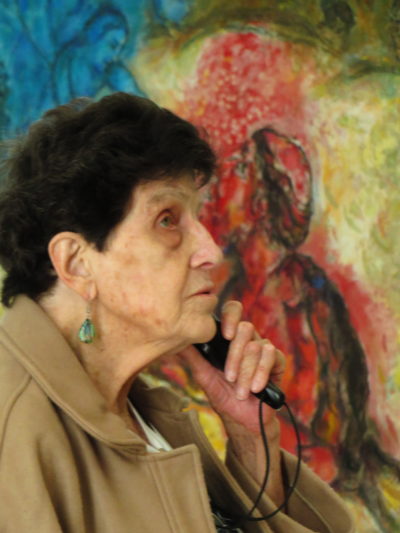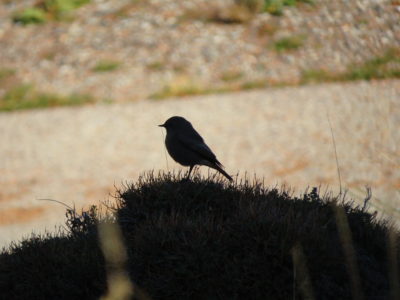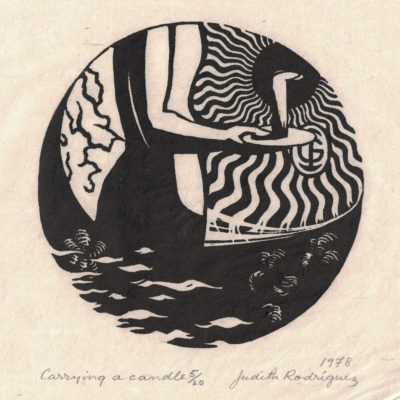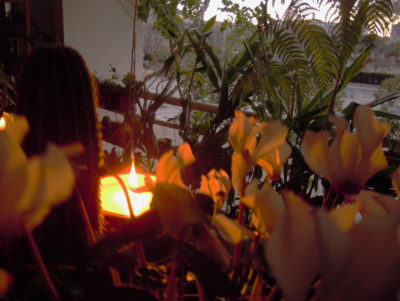Un bouquet de mots pour Judith Rodriguez
Le 16 février 2019 a lieu, à Melbourne, en Australie, un hommage à Judith Rodriguez, poète dont l'influence se mesure déjà au nombre des jeunes poètes qu'elle a soutenus et accompagnés, et qui y témoigneront leur attachement à cette figure de proue qu'elle était à sa façon, toujours en première ligne de tous les combats (elle a représenté pendant de très longues années le Penclub international d'Australie, par exemple) : militant pour la culture populaire, la défense de la culture aborigène, les droits des femmes, la défense des immigrés et de ces clandestins arrivés par mer et rejetés dont elle parle dans Boat Voices... L'ampleur de sa culture, internationale, l'originalité de sa vision de la poésie, méritent qu'elle soit connue aussi en France, ce à quoi nous nous appliquerons, en commençant par ce florilège composé de poèmes de Dominique HECQ((https://www.recoursaupoeme.fr/auteurs/dominique-hecq/)) (qui a colligé et traduit les textes australiens), Nathan CURNOW ((Nathan Curnow is a lifeguard, poet and spoken word performer. His previous books include The Ghost Poetry Project, RADAR and The Apocalypse Awards. His first collection No Other Life But This was published in 2006 with the help of Judith Rodriguez’s keen eye and invaluable guidance.)) , Amanda ANASTASI((Amanda Anastasi is an Australian poet whose work has been published as locally as Melbourne’s Artist Lane walls to The Massachusetts Review. Her collections are ‘2012 and other poems’ and ‘The Silences' with Robbie Coburn (Eaglemont Press, 2016). She is a 2018 recipient of the Wheeler Centre Hot Desk Fellowship.)), Alex SKOVRON ((Alex Skovron is the author of six poetry collections, a prose novella and a book of short stories, The Man who Took to his Bed (2017). His latest volume of poetry, Towards the Equator: New & Selected Poems (2014), was shortlisted in the Prime Minister’s Literary Awards. He lives in Melbourne.)), et sa traductrice.

Judith Rodriguez au musée Chagall de Nice, 2016 ©photo mbp
Les Etoiles d'Utelle
Marilyne Bertoncini
pour Judith Rodriguez
Hier je l’ignorais encore
mais c’est dans tes yeux que j’ai vu
pour la première fois
les étoiles d’Utelle((* Dans les Alpes Maritimes, la chapelle de la Madonne d’Utelle, fondée vers l’an 850 par des pêcheurs espagnols, sauvés du naufrage par une étoile, aperçue dans la nuit et la tempête au sommet de la montagne, est un sanctuaire et lieu de pélerinage. On y trouve des fossiles de crinoïdes, en forme de minuscules étoiles à 5 branches, que la tradition considère comme des dons nocturnes de la Vierge.))
En les cherchant dans la poussière
Je l’ignorais encore
Mais c’était toi que je cherchais
Comme autrefois mes Antipodes
Frêles fossiles au creux des mains
Ces étoiles minuscules
sont ta main d’ombre que je tiens
Par-delà toutes les distances
C’est ta voix d’ombre dans le vent
Qui balaie le plateau d’Utelle
Et la chevelure des pins
Et la mer aperçue au loin
Je pense aux naufragés du Palapa((Judith Rodriguez est l’auteure d’une série de poèmes – Boat voices (en cours de traduction – publiés dans l’édition originale de The Feather Boy, éd. Puncher & Wattmann ) : elle y évoque le drame des réfugiés, refoulés des côtes australiennes – qui fait écho à bien d’autres drames, passés et présents.))
the shoal shining, eyes
beyond the margin’s predictable lives
Auxquels tu as donné ta voix
Comme à tant d’autres autour de toi
Ici c’est un naufrage aussi
Qui bâtit la chapelle
Où la Madone rendit sa voix
A la Demoiselle de Sospel
Et ces étoiles du fond des mers
Et des milliers de millénaires
Retrouvent ici dans la lumière
Leurs sœurs célestes qui pétillent
Dans le velours des nuits où brille
le souvenir de tes yeux noirs.
The Stars of Utelle
for Judith Rodriguez
I didn't know it at that time
but that's in your eyes I had seen
for the very first time
the stars of Utelle((in Utelle, in the south of France, tiny fossils are found near a chapel, built after mariners had survived a shipwreck, and thought for centuries to be miraculous gifts from the Virgin.))
Searching for them in the dust
I still didn't know it
but it was you I was searching for
as I did once my Antipodes
Frail fossils in my hands
these tiny stars
are your shadow hand in mine
beyond any distance
And your shadow voice's in the wind
sweeping the highs of Utelle
the hairy pines
and the sea in the distance
I remember the shipwrecked of the Palapa
the shoal shining, eyes
beyond the margin’s predictable lives
to whom you had given your voice
as you did to many around you
Here a shipwreck similarly
built this chapel
where the Virgin gave her voice back
to the Damigel of Sospel
And these stars from the deepest sea
and from thousands of thousand years
meet back here in the light
their celestial glittering sisters
in the velvety nights where shines also
the memory of your black eyes.

©photo mbp
A Voice
Dominique Hecq
For Judith
Says nothing and everything where silence originates
Moonlight catches your shadow
walking closer to streams of dark
rivulets of light about to gel, broken winglets
ankle your shape
I ease my way into the night
all ears, grief a dummy stopping my mouth
And what do you write, you ask in another time
Apricots hang from your friend's tree
we argue about things poetical, political, heretical, fall
in a heap of white wine giggles
Apricots are little moons at dawn
we argue about the shape of words and sounds
most of all their libidinal, even illicit power
You chide me for using jargon
Thirty years later, I make apricot jam
poeming as I inhale the fruit’s aroma
I laugh at my affectation, a nod
in your direction
say nothing
everything, caught in echoes of your voice
Une voix
Pour Judith
Ne dit rien et dit tout au point d’origine du silence
Le clair de lune attrape ton ombre
qui se rapproche du ruissellement d’ombres
sources de lumière sur le point de gélifier, des ailettes cassées
assaillent ta silhouette aux chevilles
Je m’installe dans la nuit
oreilles pointées, le chagrin une tétine me clouant la bouche
Des abricots pendillent de l’arbre chez ton amie
nous débattons de choses poétiques, politiques, hérétiques, éclatons
d’un rire arrosé de vin blanc
Les abricots sont des petites lunes à l’aube
nous débattons de la forme des mots, de leurs sonorités
surtout de leur pouvoir libidinal, si pas illicite
Tu me reproches l’emploi de jargon
Trente ans plus tard, je fais de la confiture d’abricots
poèmant tout en respirant l’arôme des fruits
Je ris de mon affectation, un hochement de tête
vers toi
ne dis rien
dis tout, prise dans les échos de ta voix
*
Now
Nathan Curnow((Nathan Curnow is a lifeguard, poet and spoken word performer. His previous books include The Ghost Poetry Project, RADAR and The Apocalypse Awards. His first collection No Other Life But This was published in 2006 with the help of Judith Rodriguez’s keen eye and invaluable guidance.))
I know you’re gone
but even now
the dumb surprise of grief
sometimes in a blackout
by candlelight
I’ll enter a room
and catch myself
turning the light switch on

©Judith Rodriguez, Carrying-a-candle-1978
Maintenant
Je sais que tu es partie
mais même maintenant
la sidération du chagrin
comme lors d'une panne d'électricité
avec une chandelle
entrer dans une pièce
et se surprendre
à vouloir allumer une lampe allumée
*
Poets
Amanda Anastasi((Amanda Anastasi is an Australian poet whose work has been published as locally as Melbourne’s Artist Lane walls to The Massachusetts Review. Her collections are ‘2012 and other poems’ and ‘The Silences' with Robbie Coburn (Eaglemont Press, 2016). She is a 2018 recipient of the Wheeler Centre Hot Desk Fellowship.))
We run our fingers
over the shell of humanity
feeling for the pulse of its mettle,
the rhythms of its prejudices,
the beat of its concord;
drunk on the beautiful, redefining
its boundaries - its height, its breadth,
its colours; worshipping a horizon’s
sweep and the vein of a leaf,
the collected light of a city
and the glisten in an eye;
capturing a moment
in the universe
and the universe
in a moment.
Poètes
Nous passons le doigt
sur la coque de l’humanité
prenant le pouls de son courage,
les rythmes de ses préjugés,
la mesure de son harmonie;
saoulés de beauté – sa grandeur, sa largesse,
ses couleurs; adorant l’arc
d’un horizon et la veine d’une feuille,
la lumière réfractée d’une ville
et l’éclat d’un regard;
capturant un instant
dans l’univers
et l’univers
dans un instant.
*
Crossing
Alex Skovron((Alex Skovron is the author of six poetry collections, a prose novella and a book of short stories, The Man who Took to his Bed (2017). His latest volume of poetry, Towards the Equator: New & Selected Poems (2014), was shortlisted in the Prime Minister’s Literary Awards. He lives in Melbourne.))
for Judith Rodriguez
They are tramping past my house,
I can see them out the corner of my eye,
the one I keep open when the sunlight dazzles.
They barely glance in my direction
as they follow at a steady, deliberate pace,
crossing the street while impatient traffic idles.
I’ve seen them many times, many places,
yet always they appear the same: weary, guarded
or discomposed, striding on regardless.
What do they harbour in those backpacks,
those cardboard suitcases, their corners battered,
faded labels half-torn or peeling?
Where do they trudge to, their knuckles clasped
around bony handles, or clutching
the lapels of shabby overcoats?
If one of them should uplift a weathered brow
and turn to glimpse the window I inhabit,
she swiftly looks away, in reprimand.
This morning, squinting against the sun,
I ventured out, thinking I might confront them:
they walked right past, as if I wasn’t there.
I ran inside to hide among mirrors and folders,
waiting for their footsteps to recede,
unsettled by the certainty of their return.
Traverse
pour Judith Rodriguez
Ils dépassent ma maison d’un pas lourd,
je les vois tous et toutes du coin de l’oeil,
celui que je garde ouvert contre le soleil éblouissant.
C’est à peine s’ils m’adressent un regard
lorsque d’un pas mesuré et délibéré ils
traversent la rue, le trafic impatient au ralenti.
Je les ai souvent vus, un peu partout,
toujours semblables à eux-mêmes: las, furtifs
ou décomposés, allant de l’avant, imperturbables.
Mais que recèlent-ils donc dans ces sacs à dos,
ces valises de carton aux coins cabossés,
étiquettes estompées, mi-déchirées ou pelées?
Mais où se traînent-ils donc, phalanges serrées
sur de maigres poignets, ou agrippées
aux revers de manteaux râpés?
Si l’une d'entre eux lève son front ridé
balayant des yeux la fenêtre où j’habite,
elle s’empresse de détourner le regard.
Ce matin, les yeux plissés contre le soleil,
je suis sorti, avec l’intention de les aborder:
ils ont poursuivi leur chemin, comme si je n’existais pas.
J’ai filé me cacher dans mes miroirs et mes classeurs,
attendant que leurs pas s’amenuisent,
ébranlé par la certitude de leur retour.
*

©photo mbp
Sur le balcon que tu aimais
Marilyne Bertoncini
pour Judith
Sur le balcon que tu aimais
nous tenons allumée une petite flamme, afin qu’elle t’accompagne dans le froid de ton
long voyage infiniment nocturne
vers les étoiles.
Le jour, c’est un petit clou trouant la pénombre presque phosphorescente de la fougère arborescente.
Le soir, sa couleur chaude irradie d’or et de turquoise le front assombri de la plante de Tasmanie.
Ce midi, une fauvette est venue visiter les feuilles dentelées de la fougère des antipodes –
peut-être ne l’aurions-nous pas vue si, voletant autour de la flamme, son ombre dansante n’avait attiré notre regard.
Elle a sauté de feuille en feuille, jusqu’à la crosse la plus jeune,
puis a disparu dans l’azur,
de l’autre côté du balcon,
dans l’infini de l’outre-monde.
On the balcony you loved
traduction de l'autrice
for Judith
On the balcony you loved
we lit the flame of a candle, to keep you company in the cold of your long and dark endless voyage
towards the stars.
By day, it’s just a nail piercing the phosporescent shadow of the tree fern.
By evening, its warm color radiates gold and turquoise on the darker forehead of the Tasmanian plant.
At midday, a warbler visited the indented leaves of the fern from the Antipodes –
we might not have seen it if, fluttering around the flame, its dancing shadow hadn’t caught our attention.
It sprung from leaf to leaf, up to the youngest fiddlehead green,
then disappeared in the deep blue,
the other side of the balcony,
in the infinity of the outer-world.
*
A Tribute to Judith Rodriguez
By Amanda Anastasi
It is with much sadness, fondness and celebration that we recognise the passing of our poet and friend, Judith Rodriguez. She leaves behind a legacy of prolific and memorable poems. Her poetry collections include (among many others) Water Life, Shadow on Glass, Mudcrab at Gambaro’s, Witch Heart, The Hanging of Minnie Thwaits and (shortly before her death) The Feather Boy and other poems. She was the poetry editor of Meanjin for a time and also for Penguin Australia, and a recipient of the OAM for services to literature, in addition to many other honours. As well as her extensive literary achievements, she was a social justice campaigner and advocate and was involved with PEN International across three decades, fighting for freedom of expression and promoting intellectual cooperation between writers globally.
As a teacher, Judith taught writing at the CAE and previously at Latrobe University and also at Deakin University for 14 years. This was where I came in contact with her, as a first-year Professional Writing and Editing student. I still recall her insistence that all students keep a writing journal to jot down our daily thoughts, ideas and musings. I remember entering Judith’s office as a nervous 18-year-old for the end-of-semester journal showing, which she said would be a brief check to see that we were maintaining our daily writings. Upon handing my notebook to her, she proceeded to intensely read it from cover to cover over a period of 15 minutes while I stood there watching. I remembered thinking “why does she – why would she - find my thoughts and notations of interest?” It was my first glimpse of the lady’s curious mind and deep interest in other people’s thoughts and ideas. Many, many years later I encountered her again on the Melbourne poetry scene. Upon asking her to look over my first poetry collection ‘2012 and other poems’ (expecting a polite no), she gladly and readily obliged and her written testimonial graces the back cover of both editions.
Judith was not merely a teacher, she was a mentor and a supporter of emerging poets throughout her life. She saw the potential in everyone, no matter their writing style or level of ability. This poetry caper was never just about her. Rather, it was concerned with a larger, collective practice of poetry, artistic expression and craftmanship. She was a person who was confident in her abilities and doggedly focused, though without the egotism. Her natural, deep interest in the world around her preserved that humility, hands-on helpfulness and down-to-earth humour that was so very particular to her. Judith was a listener and a creative enabler. She fully utilised her time onstage and the various platforms she had been given, but viewed the platform as a thing to be shared.
Judith’s poetic output was above and beyond any label that one could possibly place on it. One wouldn’t even think of calling her “a female poet” but, rather, an “Australian poet” or “a poet”. She was simply one of our greatest wordsmiths and teachers of poetry, and a respected academic and vocal human rights activist. Her mastery of words and stoical objective to preserve free speech and diverse voices made her universally respected. What she left behind in the poems and the poets she taught means that she will be always with us. Myself and so many others who came into contact with Judith will hold the memory of her in our hearts always, as a great example of what and how we could someday be.
Hommage à Judith Rodriguez
C’est avec beaucoup de tristesse, d’amitié et de révérence que nous assumons le décès de Judith Rodriguez, chère poète et amie. Elle nous lègue un héritage de poèmes à la fois prolifique et mémorable. Parmi ses nombreux receuils de poésie, nous retenons Water Life, Shadow on Glass, Mudcrab at Gambaro’s, Witch Heart, The Hanging of Minnie Thwaits et (peu avant sa mort) The Feather Boy and other poems. Elle fut éditeur chez Meanjin et aussi, brièvement, chez Penguin Australia. Elle fut aussi récipiendaire de la médaille d’honeur de l’Ordre d’Australie pour services rendus à la literature. En plus de ses accomplissements littéraires, elle milita avec ardeur pour la justice sociale dans le cadre de PEN International durant trois décennies, défendant férocement la liberté d’expression et encourageant la coopération intellectuelle entre écrivains à l’échelle globale.
En tant qu’enseignante, Judith exerça au Conseil d’éducation pour adultes (CAE) ainsi qu’à La Trobe University et Deakin University, où elle enseigna pendant quatorze ans. C’est là que je l’ai rencontrée quand j’étais étudiante en première année dans la section Ecriture Professionnelle et Edition. Je me souviens encore combine elle exigeait que nous prenions note de nos menues pensées, idées et réflexions quotidiennement dans un journal. Je me souviens lui avoir montré mon journal en fin de semestre cette année là pour qu’elle vérifie que j’avais respecté la consigne. J’avais dix-huit ans et j’étais nerveuse. Elle a pris mon journal et elle s’et immédiatement plongée dedans. Il lui a fallu quinze minutes pour couvrir le tout. Je la regardais et je me souviens m’être demandé pourquoi trouve-t-elle –pourquoi trouverait-elle –mes pensées et mes annotations intéressantes. C’était la première fois que je voyais à l’oeuvre l’esprit bizarre de la femme et l’intérêt qu’elle portait à autrui. Bien plus tard, je l’ai revue sur la scène de poésie à Melbourne. Lorsque je lui ai demandé si elle voulait bien lire mon premier receuil, 2012 et autre poèmes (m’attendant à une réponse negative), elle s’est empressée d’accepter. Elle a même rédigé une note de lecture pour la quatrième de couverture.
Judith n’était pas seulement une enseignante, elle prenait son rôle de mentor auprès de jeunes poètes très au sérieux, et cela tout au long de sa vie. Elle percevait un potentiel chez chacun de nous indépendemment du style et de la qualité de l’écriture. Ces cabrioles poétiques ne concernaient pas seulement sa personne. Elles témoignaient plutôt d’un désir de faire de la poésie une activité collective dont la raison première et fondamentale était l’intégrité artistique. Elle était quelqu’un qui avait confiance en ses capacités et elle avait une grande faculté de concentration; certes, sans l’égotisme. Une profonde curiosité envers le monde qui l’entourait préserva son humilité, serviabilité et son humour pragmatique si particulier. Judith avait le don d’écouter et d’encourager la créativité. Elle utilisait pleinement le temps qui lui était octroyé sur scène, mais elle considérait la scène comme une plate-forme à partager.
L’oeuvre poétique de Judith est imperméable à toute etiquette dont on voudrait l’affubler. Il serait même impensable de l’appeler ‘une femme poète’, mais bien au contraire, ‘un poète Australien’ ou ‘un poète’. Elle était tout simplement l’un de nos meilleurs wordsmiths, professeurs de poésie, universitaires respectés et activistes pour les droits de l’homme. Sa maîtrise de la langue et son objectif stoique de préserver la liberté d’expression lui ont valu un respect universel. Ce qu’elle a transmis dans ses poèmes et aux poétes qu’elle a formés signifie qu’elle restera toujours parmi nous. Comme tant d’autres poètes qui ont connu Judith, je garderai son souvenir dans mon Coeur en guise d’exemple de ce que nour pourrions un jour devenir.